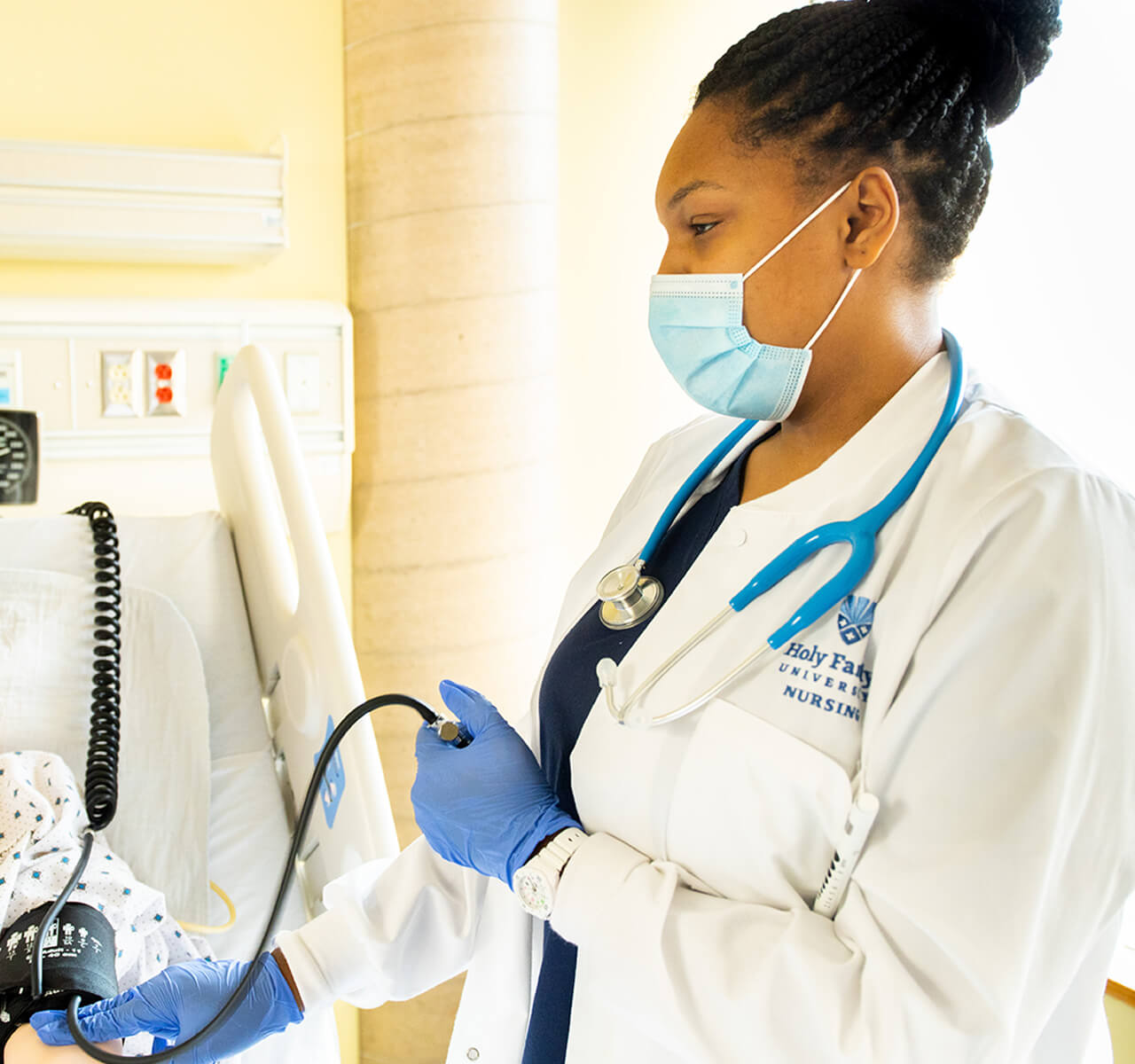About the Online ABSN Program
This full-time program demands dedication—and is one of the fastest ways to become a registered nurse. Not only is a BSN the preferred nursing degree in all health care settings (1), but RNs earn 45% higher pay than the average worker. (2). HFU nurses have impressive NCLEX-RN pass rates above the national average. (3)
- American Association of Colleges of Nursing (AACN)
- U.S. Bureau of Labor Statistics
- Pennsylvania Department of State

Accredited by the Commission on Collegiate Nursing Education
Online ABSN Curriculum Snapshot
* Courses must be taken in a specific order.
- Students must reside in Pennsylvania (excluding the following counties: Bucks, Chester, Delaware, Montgomery, & Philadelphia) to apply
- The first Baccalaureate degree has to have been earned from an accredited College or University.
- 3.0 cumulative GPA (2.75 GPA in math and science prerequisite courses)
- Personal statement
- 1 letter of recommendation from a supervisor or academic professor
Access Your Program Guide
Access your digital program guide to learn more about our online ABSN curriculum.
- CCNE Accredited
- 59 credit hours
- 504 clinical hours
- $883 per credit hour
- 14 months
- One week on-campus residency
- Synchronous and Asynchronous sessions
- 3 start dates per year
- Approved by the PA State Board of Nursing
Communication/Collaboration
Contribute to healthcare safety and patient wellbeing through effective communication and collaboration
Critical Thinking
Optimize patient outcomes by strengthening critical thinking skills as they relate to clinical judgment
Cultural Humanity
Develop an informed understanding of diverse cultures to deliver care with empathy and awareness
Evidence-Based Nursing Practice
Approach nursing care from an evidence-informed mindset as you develop essential clinical skills
Professional Values
Provide compassionate, accountable, and ethical care and serve as an advocate for patients and populations
Information Technology
Employ modern information technologies to ensure safety and quality care
Healthcare Policy
Adopt an informed, global perspective on today’s healthcare issues and policies
Applicants must complete the following courses within the past 10 years, earning a grade of C* or higher:
- Anatomy & Physiology I with lab
- Anatomy & Physiology II with lab
- Microbiology with lab
- Nutrition (taught by a registered dietician)
- Elementary statistics
*Note: only one grade of C is allowed across prerequisites. You may repeat a course only once if you earned a C or lower. Any prerequisites completed more than 10 years ago will not be accepted.
Affordable Tuition - ABSN Comparison
Feel confident investing in your future with a fast, cost-effective and quality program. At $883 per credit hour, Holy Family University gives more flexibility to your finances and schedule than local competitors.
See how we compare in the table below.
| Holy Family University Online |
Misericordia University Online |
York College of Pennsylvania In-Person |
|
|---|---|---|---|
|
Tuition |
$52,077 |
$62,964 |
$48,000 - $52,000* |
|
Prerequisites |
5 |
8 |
9 |
|
Duration |
14 months |
16 months |
17 months |
Based on publicly available information that is subject to change (updated August 2023).
*Includes fees
Holy Family University is accredited by the Middle States Commission on Higher Education (MSCHE) and undergoes periodic reviews to maintain its accreditation. The latest MSCHE reaffirmation self-study was conducted in 2020, and the MSCHE Committee conducted a site visit in the spring of 2021.
Holy Family University’s BSN program is approved by the PA State Board of Nursing and accredited by the Commission on Collegiate Nursing Education (CCNE).*
* The baccalaureate degree in nursing and master's degree in nursing at Holy Family University are accredited by the Commission on Collegiate Nursing Education, 655 K Street, NW, Suite 750, Washington, DC 20001.
This course is designed to introduce students to fundamental concepts in nursing care. The nursing process is used as the framework for clinical reasoning. Emphasis is placed on developing basic skills needed to assess, plan, implement, and evaluate selected nursing interventions and technologies. Students gain competency through practice in a supportive and supervised environment in a nursing laboratory. (5 credits)
This course provides the students with an immersion into professional nursing. Health assessment and illness prevention are presented through a concept-based framework. Students are introduced to the nursing care of individuals experiencing selected health alterations with concurrent clinical experiences. (7 credits)
In this course, the physiological, psychosocial, cultural, spiritual, and environmental changes experienced by older individuals and their families are examined. Theories of aging, healthy aging, restorative care, and supportive interventions to promote and maintain wellness in older adults are explored. Emphasis is placed on the nurse's role as coordinator of care for older adults and their families. The special advocacy issues of older clients and their families are also addressed. (2 credits)
The evidence-based nursing practice examines the promotion, maintenance, and restoration of health in infancy and childhood. Environmental influences on the child’s physical, social, and psychological health are explored. Legal, ethical, and cultural influences on healthcare in childhood are considered. Multidisciplinary relationships with the family at the center of care are discussed in the context of holistic, humanistic, and altruistic nursing practice. Concurrent clinical experiences provide opportunities to apply critical thinking. (4 credits)
This course provides the student with a review of the integration of nursing concepts. Students participate in an interactive application by utilizing exam questions and essential concept reviews. (1 credit)

















